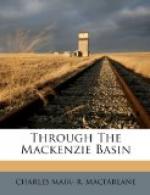We camped for the night below a point where the river makes a sharp bend, parallel with its course. This we surmounted in the morning, following a rounded wall of limestone, for all the world like a decayed rampart of some ancient city. A wide floor of rock at its base made beautiful walking to a place where the lofty escarpment showed exposures of limestone underlying an enormous mass of dark sandstone, topped by tar-clay. It is a portentous cliff, bearing a curiously Eastern look, as if some great pyramid had been riven vertically, and the exposed surface scarred and scooped by the weather into a multitude of antic hollows, grotesque projections, and unimaginable shapes. Here, also, the knives of passers-by had carved numerous autographs, marring the majestic cliff with their ludicrous incongruity. Are we not all sinners in this way? “John Jones,” cut into a fantastic buttress which would fittingly adorn a wizard’s temple, may be a poor exhibit of human vanity; but, after all, the real John Jones is more imperishable than the rock, which seems scaling, anyway, from the top, and may, by and by, carry the inscriptions with it. It was hard to tear one’s self away from such a wonderful structure as this, the most striking feature of its kind on the whole river.
Farther on, escarped banks, consisting of boulders and pebbles imbedded in tenacious clay, rose to a great height, their tops clothed with rich moss, and wooded with a close growth of pine, the hollows being full of delicious raspberries, now dead ripe.
By and by we encountered the Long Rapids—Kaukinwauk Powestik—and, some hours afterwards, entered the Middle Rapid—Tuwao Powestik—the worst we had yet come to, full of boulders and sharp rocks, with a strong current. Very dexterous management was required here on the part of steersman and bowman; a snapt line or a moment’s neglect, and a swing to broadside would have followed, and spelled ruin.
It was evening before this rapid was surmounted, and all hands, dog-tired with the long day’s pull, were glad to camp at the foot of the Boiler Rapid, the next in our ascent, and so called from the wrecking of a scow containing a boiler for one of the Hudson’s Bay Company’s steamers. It was the most uncomfortable of camps, the night being close, and filled with the small and bloodthirsty Athabasca mosquito, by all odds the most vicious of its kind. This rapid is strewn with boulders which show above water, making it a very “nice” and toilsome thing




